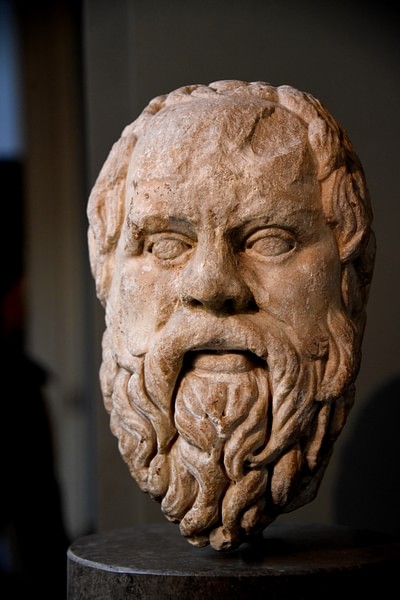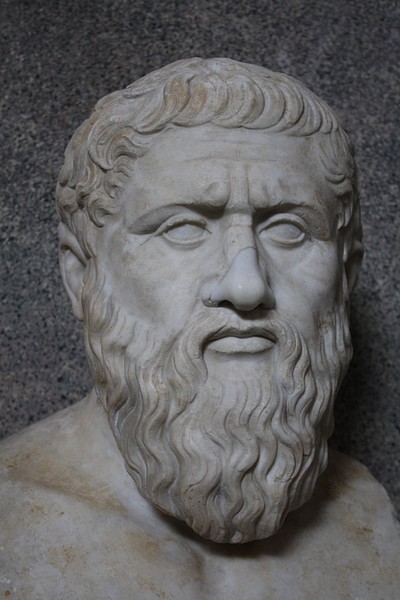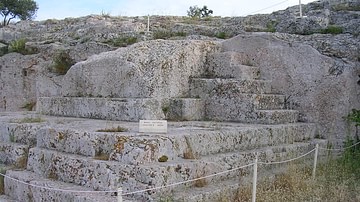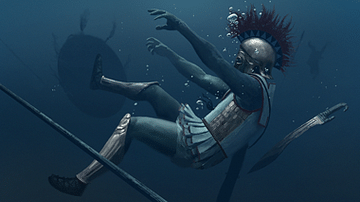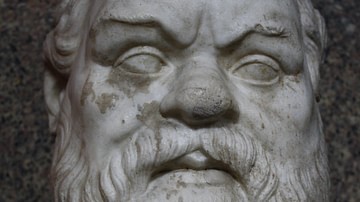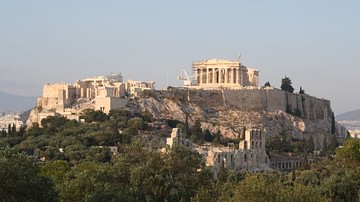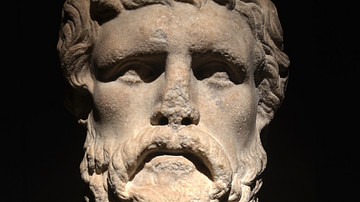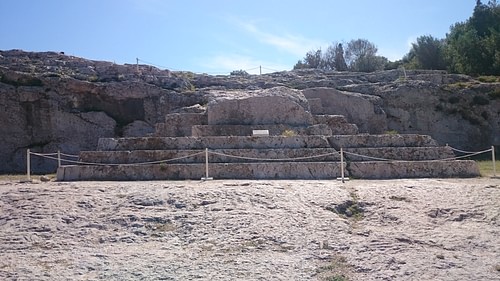
Critias (l. c. 460-403 BCE) was an Athenian politician, poet, and playwright, one of Socrates' followers, Plato's second cousin, a leading member of the Thirty Tyrants of Athens, and leader of the oligarchy they established. He is referenced by other writers as a gifted poet and philosopher, but is best known for his ruthlessness as an oligarch of Athens.
His central role in the many abuses of power perpetrated by the Thirty Tyrants overshadowed his earlier achievements as a creative and philosophical influence in Athenian society. Besides his role as one of the Thirty Tyrants, he is also frequently cited as an early atheist who defied the religious conventions of his time. He claimed that the concept of divinity was invented by men who wished to have power over others and so concocted a fable of supernatural beings who would reward or punish behavior in keeping with the agenda of the elite. Professor Thomas Mautner notes that “his is the earliest statement on record that religion is invented by politicians in order to control the people” (116). To Critias there are no gods or a single God; religion is simply a means whereby the strong and entitled control the weak.
Even so, this charge of atheism is based on a single fragment from one of his plays, placed in the mouth of a character, and since none of the rest of the work remains, it is impossible to know whether this character spoke for the author. Later writers, following the paradigm of Xenophon who knew Critias, repeated the claim that he was immoral and an atheist but this cannot finally be ascertained completely. It would certainly seem, however, that people's low opinion of him was justified by his actions during the rule of the Thirty Tyrants. This association with the oligarchy would eventually lead to his death as he was killed in battle in 403 BCE at Piraeus in the conflict which ended their rule.
Early Life & Rise to Power
Critias was born in Athens, the son of Callaeschrus, a philosopher, poet, and politician. Nothing is known of his early life, but it seems that he followed his father's pursuits and achieved a significant level of success. He first enters the historical record in 415 BCE in an incident related to charges of desecrating the statues of Hermes in Athens, but this is a slight reference which provides little information on why the charges were brought or what Critias was doing at that time. All that is known about the incident is that Critias was cleared of the charges on the testimony of one Andocines.
By 411 BCE, he may have been involved in the political oligarchy known as the Council of the Four Hundred (or, simply, The Four Hundred), an anti-democratic faction that briefly held power in Athens. His participation in this group's efforts is questioned as it is known that he prosecuted one of its leaders, Phrynicus, posthumously in 410 BCE. Although his prosecution of Phyrnicus is often interpreted to mean he opposed the Four Hundred, it is just as likely that, after they fell out of favor, Critias sided with the pro-democracy faction when it was clear they were gaining power.
He was a friend and supporter of the general and statesman Alcibiades (l. c. 451-c.403 BCE) who played a significant, and controversial, role in the Second Peloponnesian War (431-404 BCE). When Alcibiades was charged with desecrating the statues of Hermes, and also profaning the Eleusinian Mysteries by drinking the sacred Kykeon at a party, Critias followed him into exile in c. 406 BCE. Critias returned to Athens in 404 BCE to again take up a political position as one of the Five Ephors (magistrates) who led the political factions of the emerging oligarchy which came to be known as the Thirty Tyrants.
The Thirty Tyrants & Socrates
The Thirty Tyrants (or The Council of Thirty) were a pro-Spartan oligarchy who were installed in power by the Spartan General Lysander following Athens' defeat by Sparta in the Second Peloponnesian War in 404 BCE. The Thirty Tyrants severely limited the rights and freedoms of the citizens of Athens and, most notably, their right to vote as well as showing little scruple in having their opponents executed or exiled on the slightest whim. Of the thirty men who comprised this council, Critias was the most ruthless. He was held in especially low esteem for his practice of confiscating citizen's property by misusing his power and executing those who disagreed with or challenged him.
Among his first victims was his former friend Alcibiades who was still living in exile. Critias gave the order for his assassination, and he was murdered at his home in 403 BCE. Alcibiades and Critias had both been associates and onetime students of Socrates. Critias' association with Socrates did little to help the latter's case in court in 399 BCE when the Athenian citizens Meletus, Anytus, and Lycon charged him with impiety and corrupting the youth of the city.
Prior to his dark history as a politician, as noted, Critias was a writer of tragedies and elegies and was highly praised for his prose works. Professor William Morison writes:
Critias produced a broad range of works and was a noted poet and teacher in his own time. The fragments of three tragedies and a satyr play, a collection of elegies, books of homilies and aphorisms, a collection of epideictic speeches, and a number of constitutions of the city-states both in poetry and prose all have been passed down in the works of later authors. (IEP: Critias, 1)
That he should descend from the role of artist to tyrant no doubt furthered the suspicion among the Athenians that some corrupting force must have exerted itself on the young man to drive him to such excess in cruelty and villainy, and that 'force' seemed to them to be Socrates. Professor Forrest E. Baird notes how “Socrates' accusers at his trial made much of the connection. The implication was that Socrates' teaching had led Critias to his excesses” (46). Since Meletus, Anytus, and Lycon were trying to persuade the jury that Socrates was a corrupter of youth, they naturally needed an example to support their claims and it is thought they found – or invented – one in Critias who, by that time had been dead for four years.
Whether Socrates really had anything to do with Critias' shift from poet-philosopher to brutal politician hardly mattered to his accusers because, in the aftermath of the fall of the Thirty Tyrants, anyone who had been associated with them was suspect and it was known that Critias had protected Socrates from the Thirty Tyrants when he was in power. Further, Critias' atheism could be blamed on Socrates who encouraged people to question the accepted version of Greek religion. An example of how he went about this and its effects on a typical Athenian youth can be seen in Plato's dialogue of the Euthyphro in which haughty, young Euthyphro, who claims to know all about the gods and their will, encounters Socrates and is drawn into a conversation which forces him to question all he claimed to know.
Although this connection between Critias' corruption and Socrates is claimed by many scholars besides Baird, there is no mention in Plato's Apology nor in Xenophon's Defense of Socrates (the two extant accounts of the trial) of his accusers specifically citing Critias in their prosecution. It seems the claim arises from the probability that it could have been argued that Socrates had the same effect on Critias as on Euthyphro and that, in encouraging young people to question accepted authority, Socrates undermined the establishment and allowed for the possibility of the kind of chaos which ensued during the reign of the Thirty. However Critias' atheism developed, whether inspired by Socrates or simply by his own observation, it was unapologetic and stark.
The Sisyphus Fragment & Atheism
Unlike the philosopher Protagoras, who claimed the subject of whether gods existed could not properly be known by a human being, Critias claimed there were no gods and that, further, the gods were merely a construct created by men to control other men. It is interesting to note that Protagoras' more modest claim resulted in a charge of blasphemy and a death sentence which drove the philosopher into exile (he actually drowned while trying to flee the sentence) while Critias' atheism, far more blatant, is never mentioned in any court cases. It is also curious that, as far as one can tell, Critias would have written his works expressing doubt in the divine when he was younger and far less powerful than in the time of the Thirty.
In Critias' view, “A time there was when anarchy did rule / the lives of men” and the laws which were created by men to control society simply were ineffective. So “some shrewd man first, a man in counsel wise / Discovered unto men the fear of the Gods / Thereby to frighten sinners should they sin” and so the gods came to be the higher authority which would reward or punish people for what they did “secretly in deed, or word, or thought” (Baird, 47). There is no God to Critias, no divine will, no universal plan; there are only the strong who control the weak, and religion is the most effective tool the ruling class can use to maintain power and drive their agenda.
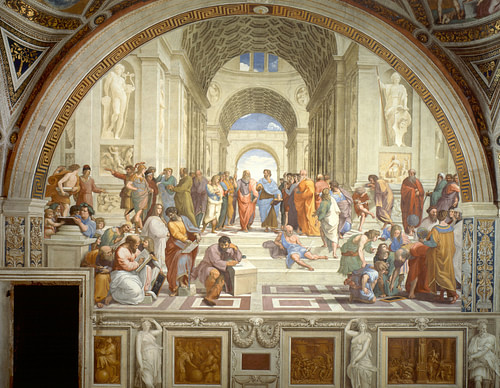
The following fragment comes from Critias' play Sisyphus, one of the few pieces of his works to have survived. If it were a letter from the man himself or an essay it would be easy to conclude that he was an atheist, but the piece seems to be a speech of one of the characters in the play, and so it is less clear what Critias' actual views were. The charge that he was an atheist comes from later writers who still had access to his writings or contemporaries (like Xenophon, another of Socrates' students) who wrote about him. The following translation comes from Kathleen Freeman's Ancilla to the Pre-Socratic Philosophers:
There was a time when the life of men was unordered, bestial and the slave of force, when there was no reward for the virtuous and no punishment for the wicked. Then, I think, men devised retributory laws, in order that Justice might be dictator and have arrogance as its slave, and if anyone sinned, he was punished.
Then, when the laws forbade them to commit open crimes of violence, and they began to do them in secret, a wise and clever man invented fear of the gods for mortals, that there might be some means of frightening the wicked, even if they do anything or say or think it in secret. Hence, he introduced the Divine, saying that there is a God flourishing with immortal life, hearing and seeing with his mind, and thinking of everything and caring about these things, and having divine nature, who will hear everything said among mortals, and will be able to see all that is done. And even if you plan anything evil in secret, you will not escape the gods in this; for they have surpassing intelligence.
In saying these words, he introduced the pleasantest of teachings, covering up the truth with a false theory; and he said that the gods dwelt there where he could most frighten men by saying it, whence he knew that fears exist for mortals and rewards for the hard life: in the upper periphery, where they saw lightnings and heard the dread rumblings of thunder, and the starry-faced body of heaven, the beautiful embroidery of Time the skilled craftsman, whence come forth the bright mass of the sun, and the wet shower upon the earth.
With such fears did he surround mankind, through which he well established the deity with his argument, and in a fitting place, and quenched lawlessness among men. Thus, I think, for the first time did someone persuade mortals to believe in a race of deities. (165)
Since no higher power exists, human beings must assert themselves as that power and, without any universal control or ultimate meaning to life, humans must find a way to provide that as well and this is the sole purpose of religion. Religion is not to be controlled, or even understood, by the masses, however; control belongs to the upper class and powerful who manipulate the lower classes for their own benefit.
Professor Baird notes that, in making these claims, Critias was "anticipating the work of Thomas Hobbes some 2,000 years later. Critias posited a primordial 'state of nature' where everyone is at war with everyone else. Penal laws are not adequate to control this anarchy; hence the need for the invention of the gods" (47). As no human power can hope to control all other human impulses at all times, religion was invented to serve this purpose. This view was completely at odds with the understanding of religious practices and the gods at this time (just as it is in the present) and added to Critias' reputation as a selfish, self-centered, and evil man.
Critias in Plato & Later Reputation
In Plato's work, Critias is represented quite differently. Plato's dialogues of the Protagoras, Charmides, Timaeus, and Critias, present a sophisticated and well-educated philosophical historian, who is articulate and thoughtful. It is from Plato's Timaeus and Critias that people became acquainted with the story of Atlantis – a tale told nowhere else and corroborated by no other ancient texts – and the speaker who tells that tale is Critias.
The myth of Atlantis was clearly intended by Plato to serve as a cautionary tale but, unfortunately, has been interpreted by later generations as a literal history deserving of countless books and exhaustive expeditions to find a civilization which never existed save in Plato's imagination. That aside, the fact that he chose Critias as the character to tell the story which highlights Atlantis and its fall from grace suggests that Plato saw another side to his cousin which was either ignored or unknown in the works of other writers of the time.
Xenophon consistently depicts Critias as an unscrupulous and vile politician whose association with Socrates condemned the latter to death. Other writers of the time and those later repeat Xenophon's opinion without qualification. Even so, it appears that the man was far more complex than the one-dimensional Athenian villain these works present. Professor William Morison writes:
The breadth of Critias' work in philosophy, drama, poetry, historical writing, rhetoric, and politics is impressive. He was not a particularly original thinker, but generalists seldom are. His leadership of the Thirty - one of Athens' darkest, bloodiest moments - has tended to overshadow his literary and philosophical work, but Critias was no ordinary despotic thug. A scion of one of Athens most noble families, highly-educated, cultured, a writer of poetry and prose, a powerful speaker, and brave, Critias was perhaps the greatest tragedy the city ever produced. (IEP Critias, 9-10)
Critias' well-attested reputation as an atheist, tyrant, and murderer is how he is best remembered, but it should be noted that this image of him was furthered by later writers and that the fragment upon which the charge of his atheism rests was part of a dramatic work and intended to be spoken by a fictional character. Whether Critias himself believed in the lines he wrote is a topic open for debate and has been challenged by scholars a number of times over the years. In the end, all one can finally conclude is that Critias was a man of many talents who seems to have allowed power to corrupt his better nature and whose name has ever after suffered for it.
